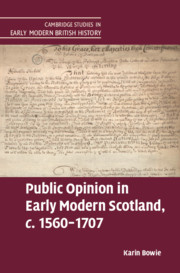Book contents
- Public Opinion in Early Modern Scotland, c.1560–1707
- Cambridge Studies in Early Modern British History
- Public Opinion in Early Modern Scotland, c.1560–1707
- Copyright page
- Contents
- Acknowledgements
- Abbreviations
- Introduction
- Chapter 1 Protestations
- Chapter 2 Petitions
- Chapter 3 Oaths
- Chapter 4 Public Communications
- Chapter 5 The Inclinations of the People
- Chapter 6 The Sense of the Nation
- Conclusions
- Bibliography
- Index
Chapter 4 - Public Communications
Published online by Cambridge University Press: 21 December 2020
- Public Opinion in Early Modern Scotland, c.1560–1707
- Cambridge Studies in Early Modern British History
- Public Opinion in Early Modern Scotland, c.1560–1707
- Copyright page
- Contents
- Acknowledgements
- Abbreviations
- Introduction
- Chapter 1 Protestations
- Chapter 2 Petitions
- Chapter 3 Oaths
- Chapter 4 Public Communications
- Chapter 5 The Inclinations of the People
- Chapter 6 The Sense of the Nation
- Conclusions
- Bibliography
- Index
Summary
This chapter considers the addressing of persuasive arguments, in oral, handwritten and printed forms and in Scots, English and Gaelic, and identifies rhetorical devices used to represent and express extra-institutional opinions in public communications. The analysis shows how dissidents worked to influence and exploit the views of supporters and how Scotland's rulers sought to manage extra-institutional opinions through a combination of censorship and their own proactive communications. The relative smallness of the Scottish print market and the gradual spread of literacy from elite to middling levels across this period meant that oral and manuscript communications remained important alongside print, producing a distinct communications culture. Though traditional figures like Lady Scotland or Jock Upaland were used to speak for the nation and people, over time collective opinions came to be represented in more literal terms as writers advanced claims about the views of the kirk, the godly and the covenanted nation.
Keywords
- Type
- Chapter
- Information
- Public Opinion in Early Modern Scotland, c.1560–1707 , pp. 137 - 184Publisher: Cambridge University PressPrint publication year: 2020

